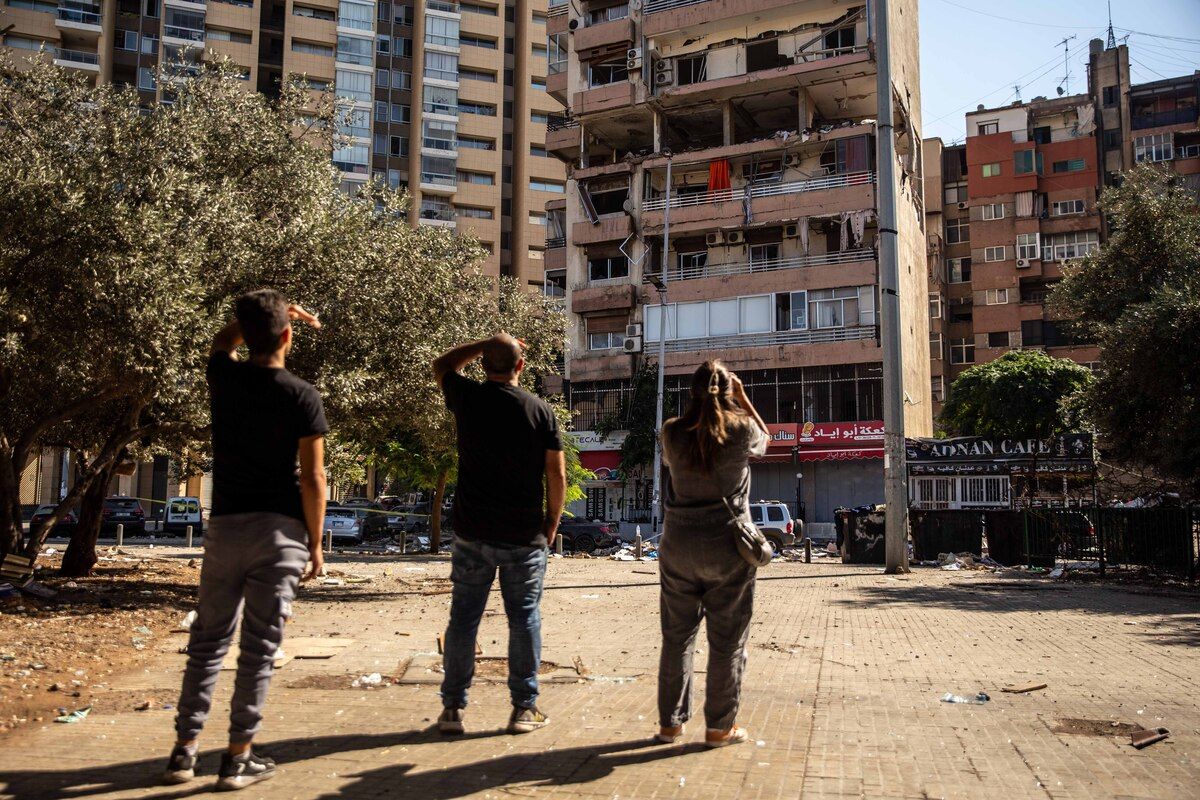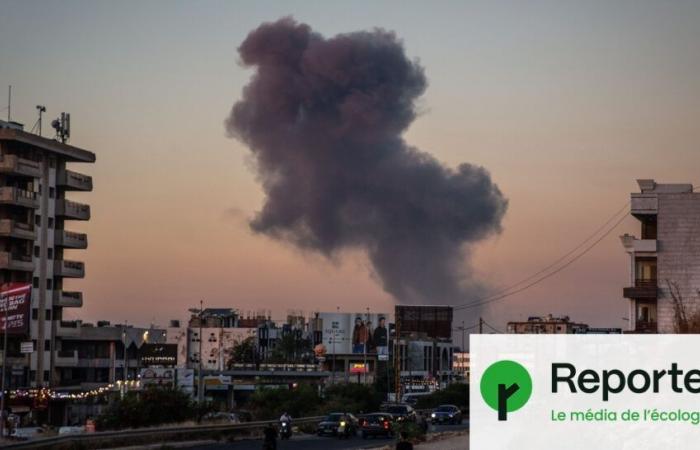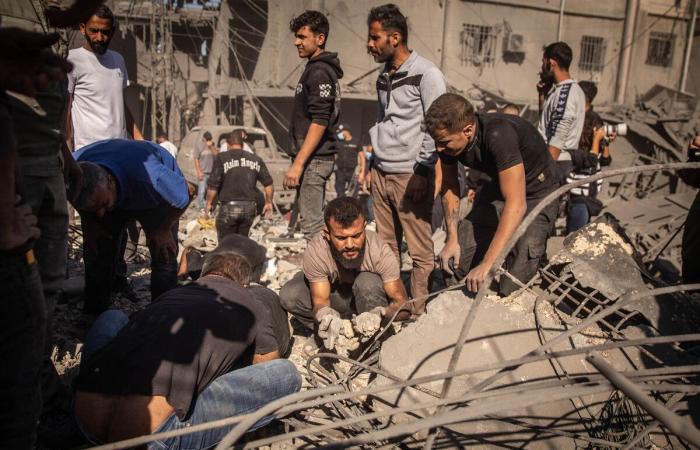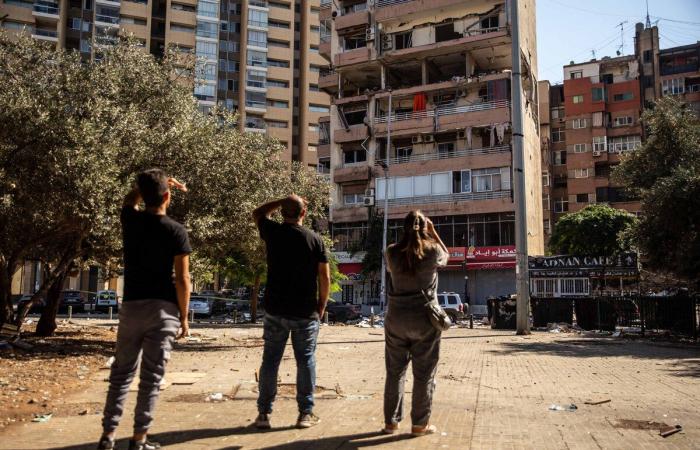Beirut (Lebanon), report
At the end of the day, the sun splashes Beirut with a soft orange light. But the sound of an Israeli drone breaks the Mediterranean serenity of late October: it buzzes above the Lebanese capital like a swarm of wasps. Suddenly he stops. In this sudden and heavy silence, Beirut residents await their fate. Their faces are worried, glued to their phones: their lives depend on tweets from the Israeli army announcing, or not, the night's airstrikes.
Suddenly, tremors are felt, dull rumblings. Sometimes distant, sometimes close. The capital lights up with mushrooms of fire, before it is enveloped in thick smoke. Everyone jumps, their hearts pounding with each bombardment, and waits for this nightmare to end.
« I start shaking whenever I hear a loud sound, even if it's not the sound of an explosion. I don't sleep at night until 7 a.m. when the explosions end »testifies Rima, 25, a Palestinian refugee living in the Shatila camp, very close to the southern suburbs of Beirut, under fire from bombs.
In a tweet from the Israeli army spokesperson, the plan for alleged Hezbollah tunnels under al-Sahel hospital, presented to the press on October 22, 2024.
© Philippe Pernot / Reporterre
Since September 23, the Israeli army has been carrying out a widespread offensive against Lebanon, with intense bombardments on Dahyeh, the south of the country and the Bekaa Valley, and a limited ground invasion on the border between the two countries. It had been almost a year since a war of positions opposed Hezbollah to the Jewish state in parallel with the war in Gaza, but this Israeli escalation turned the lives of the Lebanese upside down, killing more than 2,700 and leaving more than 1 million displaced.
Rima claims to feel constantly in danger because of drones, and to have panic attacks regularly: she lost her mother and was injured during the 2006 war. Her injuries reappear with each bombing. « War has become very technological, we see the slightest explosions on social networks, images of destruction are omnipresent. They reinforce the suffering and inner chaos, and reopen all the wounds inherited from previous wars. »explains Dr Aline Husseini, psychoanalyst in Beirut.
« Israel can choose any building, raze it, kill everyone inside »
For her, nighttime bombings and the omnipresence of drones reinforce the harmful effects of war. « Drones give a feeling of being observed, persecuted, an expectation of danger. With the explosions, people no longer sleep and have insomnia. The idea that any building can be destroyed at any time is extremely difficult to comprehend. Even those in spared areas live in fear of death »she explains. Which leads experts to say that Israel is also waging psychological warfare using its advanced technologies.
Technological superiority
« For me, dystopia started with the attack of the pagers and has been getting worse ever since. Everything seems surreal »testifies Jad Dilati, human rights researcher and co-author of a research article on Israeli psychological warfare in Lebanon. On September 18 and 19, more than 5,000 communications devices used by Hezbollah exploded simultaneously in two waves, killing more than thirty people and injuring 3,1000 — members of Hezbollah, but also many civilians.
« Israel wanted to make us understand that it is 1,000 times technologically superior »he adds. Since then, air strikes have continued on the country, with drones and missiles tracking their targets to the farthest reaches of the country, even in the most remote areas.
« Israel can literally pick any building, raze it, kill everyone inside, and carry on as if nothing happened. It's filmed live and we depend on tweets from the spokesperson for the Israeli army, our enemy, to know whether we will stay alive or die, even though they are often misleading. If it's not dystopian ! » he said.
At the scene of an Israeli strike near a Beirut hospital on September 21, 2024, which killed eighteen civilians, including several children, and destroyed an entire block of houses. Here, October 22, 2024.
© Philippe Pernot / Reporterre
In a year of war, since October 8, the technological imbalance between Israel and Hezbollah has only been confirmed. If the Lebanese Shiite armed group and political party succeeded in carrying out drone attacks as far as Tel Aviv, the IDF carried out almost ten times as many bombings, assassinated almost all of its senior leaders, including Hassan Nasrallah, and demonstrated its ability to invade Lebanese territory and raze entire villages there, despite significant losses.
All this, based on cutting-edge military technologies, of which Israel is one of the leading exporters in the world, while receiving 17.9 billion dollars (16.5 billion euros) in US military aid.
« A nightmare scenario »
« The Israeli army tests its new technologies on Palestinians in the West Bank and Gaza — and even on its own citizens, notably during anti-government protests — before selling them abroad »observes Alessandro Accorsi, war technology analyst at Crisis Group. This would particularly be the case for surveillance technologies using facial recognition, automatic turrets and armored cars, but also artificial intelligence (IA), which the Israeli army denies.
An Israeli media investigation +972 published last April claims that Israel uses three pieces of software in its war in Gaza, which have caused more than 42,000 deaths in one year. The first, Lavender, would be used to detect potential targets by sifting through information accessible online. The second, Gospel, would designate strategic buildings to be destroyed. The third, darkly named Where’s Daddy ? (« Where is Dad ? »), would track targets on their journeys and at home.
Algorithmic warfare
« These softwareIA allowed Israel to designate and bomb more than 35,000 targets in Gaza that it believed belonged to Hamas. And this, in just a few months, much faster than if humans had had to cross-check all this information »explains Alessandro Accorsi.
Israeli soldiers would sometimes have only twenty seconds to review the data from theIA and decide whether to approve a bombing or not. « We can ask ourselves if the responsibility [de tuer] is still carried by humans, or if it is completely lost between the machine and the chain of command. When it comes to ethics, this is a nightmare scenario and a very complex dilemma »says the expert.
As for the application of these technologies in Lebanon, it is uncertain. « Israel has been planning a new war against Hezbollah since the 2006 war, so it is not as reliant on technology to establish targets. It relies heavily on human intelligence. If the pager attack, for example, seemed very technological, it was based entirely on inside information and on techniques that were not at all cutting-edge. »analyzed by Alessandro Accorsi.

After a drone strike in Beirut killed three members of the Popular Front for the Liberation of Palestine (FPLP), Palestinian political party and armed group. Here, September 30, 2024.
© Philippe Pernot / Reporterre
According to him, the war in southern Lebanon would be much more like traditional wars, with its massive bombings and fierce battles to conquer kilometer after kilometer. « We have the idea that today, strikes are very precise. In fact, we do not see a big difference with the bombings in Vietnam or during the Second World War. ; the armies claimed to be targeting targets, but caused many civilian casualties »he said.
The difference, according to the analyst, is mainly due to the types of bombs used by Israel, which weigh between 450 and 900 kg: « These are munitions that other countries, such as the United States, have stopped using in order to limit civilian casualties to around ten per bomb. Israel, on the other hand, accepts thresholds of 40, 50 or even 100 civilians killed depending on the importance of the target ». A way of waging war that is more than questionable under international law. In South Lebanon, some very powerful explosions almost created an earthquake along a seismic fault.
If these fights give the impression of being an algorithmic or robotic war, they are above all part of a dark lineage of murderous and bloody conflicts.
Responses from the Israeli army
The Israeli army responded by email to requests from Reporterreasserting that « contrary to what is claimed, [les forces israéliennes] do not use artificial intelligence systems that identify terrorist agents or attempt to predict whether a person is a terrorist. Information systems are simply tools for analysts in the process of identifying targets ». She also claims that she « strikes only military objectives and military agents and carries out strikes in compliance with the rules of proportionality and precaution in attacks ».









